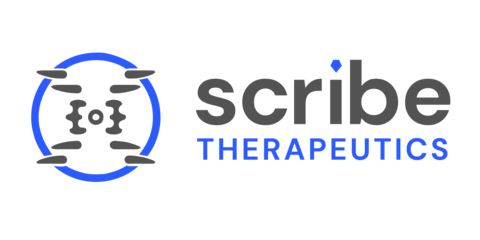Scribe Therapeutics Reports Preclinical Data Validating its CRISPR Genome Editing and Epigenome Modifying Technologies for Addressing Cardiometabolic Disease at American Heart Association (AHA) Scientific Sessions 2024
Scribe Therapeutics Reports Preclinical Data Validating its CRISPR Genome Editing and Epigenome Modifying Technologies for Addressing Cardiometabolic Disease at American Heart Association (AHA) Scientific Sessions 2024
- Scribe’s CRISPR epigenetic silencing technology, ELXR, demonstrated dramatic and sustained lowering of LDL-C by up to 67% for nearly 6 months in non-human primates – without altering DNA sequence.
- In a second program, the company’s XE gene editing technology demonstrated highly effective reduction of APOC3 and triglyceride levels by >90% in vivo.
- Additional work with XE highlighted the exceptional potency and selectivity of Scribe’s engineered CRISPR gene editing platform, demonstrating saturation of PCSK9 gene editing in the non-human primate liver with no observed off-target effects at supersaturating doses.
ALAMEDA, Calif.--(BUSINESS WIRE)--Scribe Therapeutics Inc. (Scribe), a genetic medicines company unlocking the potential of CRISPR to transform human health, presented preclinical data on its CRISPR X-Editor (XE) and Epigenetic Long-Term X-Repressor (ELXR) technologies at the American Heart Association’s Scientific Sessions 2024.
The new data described in Scribe’s late-breaking, oral, and poster presentations showcase the highly potent, specific, and safe editing capabilities of the company’s XE and ELXR platforms. The technologies are highly engineered, programmable CRISPR-CasX nucleases with optimized activity and specificity for broad patient populations.
Notably, these data highlight Scribe’s validation of these technologies in non-human primates. This includes the durable reduction of low-density lipoprotein cholesterol (LDL-C) of up to 55% for at least a year by the XE platform and ELXR-mediated LDL-C lowering of up to 67% for nearly 6 months at therapeutically relevant doses. Additionally, the company’s XE technology demonstrates significant reduction of apolipoprotein C-III (APOC3) protein by more than 90%, triglycerides by 97%, and total cholesterol by 84% in mice.
“Scribe has effectively engineered novel, highly potent, and selective CRISPR technologies to enable genetic medicines safe enough for large cardiometabolic populations,” said Benjamin Oakes, Ph.D., co-founder and Chief Executive Officer of Scribe. “We are pleased to report the validation of two distinct approaches, editing and epigenetics, with industry-leading preclinical data demonstrating potency, specificity, and safety. This latest progress moves us closer to a genetic medicine solution for millions of people suffering from chronic diseases.”
“Patients suffering from cardiovascular disease – the leading cause of death worldwide – are in need of more effective, safe, and durable treatments,” said Aarif Khakoo, M.D., M.B.A., Chief Scientific Officer and Head of Research and Development at Scribe. “As demonstrated by the data we have presented at AHA, Scribe is the only company that is driving the development of platforms for gene editing and epigenetic modification, paving the way for multiple routes of treatment.”
Summarized below are highlights from the company’s AHA presentations:
Late-Breaking Presentation: A Novel CRISPR-based Epigenetic Silencer Potently, Durably, and Safely Reduces LDLc in Non-Human Primates at Therapeutically Relevant Doses
- Scribe has created novel epigenetic modifiers (ELXRs) that enable durable silencing of target genes without changing the underlying genomic sequence.
- To target PCSK9 for potent and safe LDL-C lowering, Scribe engineered STX1150, a CasX-based epigenetic silencer that substantially reduces PCSK9 secretion and exhibits no significant off-target changes in gene expression compared to non-targeting baseline at a 3x saturating dose in vitro.
- STX1150 achieves durable methylation and suppression of the PCSK9 locus, resulting in sustained LDL-C reduction of up to 67% in non-human primates.
- At the therapeutically relevant dose of 0.75 mg/kg, STX1150 lowers LDL-C by ~50% and exhibits a favorable tolerability profile.
- Findings illustrate that CRISPR epigenetic LDL-C lowering therapy has the potential to be on par with, if not exceed, standard of care approaches.
Moderated Digital Poster Presentation: Engineering and Development of Optimal CRISPR Based Genome Modification Molecules for Safe and Effective LDL-C Lowering
- After assessing the advantages and challenges of various gene editing technologies, Scribe has chosen to engineer novel gene editing (XE) and epigenetic silencing (ELXR) technologies for LDL-C lowering and other cardiometabolic diseases.
- Both XE and ELXR demonstrate durable serum PCSK9 reduction in a human PCSK9 transgenic mouse model for >300 days.
- XE achieves potent editing activity and long-term LDL-C reduction of up to 55% for one year in non-human primates.
- XE exhibits high specificity – no detectable off-target editing was observed at 10x saturating dose of XE in primary human hepatocytes.
Presentation: A Single-Dose of a Novel CasX-Editor Lowers APOC3 Levels In Vivo
- STX1400 is a novel investigational CasX-based gene editing therapy for hypertriglyceridemia in familial chylomicronemia syndrome (FCS) and severe hypertriglyceridemia (sHTG) patients.
- STX1400 robustly decreases APOC3 mRNA and protein levels in vitro in a dose-dependent manner.
- Delivery of STX1400 into the liver of human APOC3 transgenic mice and hypertriglyceridemic mice potently reduces APOC3 protein levels by >90%.
- Treatment with STX1400 effectively reduces triglycerides and total cholesterol in hypertriglyceridemic mice.
About Scribe Therapeutics
Scribe Therapeutics is revolutionizing the development of optimized in vivo CRISPR-based genetic medicines designed to become standard of care treatments for patients suffering from highly prevalent diseases, starting with cardiometabolic disease. Our CRISPR by Design™ approach engineers bacterial immune systems into a premier suite of genome and epigenome editing tools built for unique molecular advantages in activity, specificity and deliverability that translate into safer and more effective genetic therapies. Co-founded by Nobel Prize winner Jennifer Doudna and backed by leading life sciences investors, Scribe is engineering the future of genetic medicine. To learn more, visit www.scribetx.com.
Contacts
Media Contact:
Thermal for Scribe Therapeutics
media@scribetx.com
